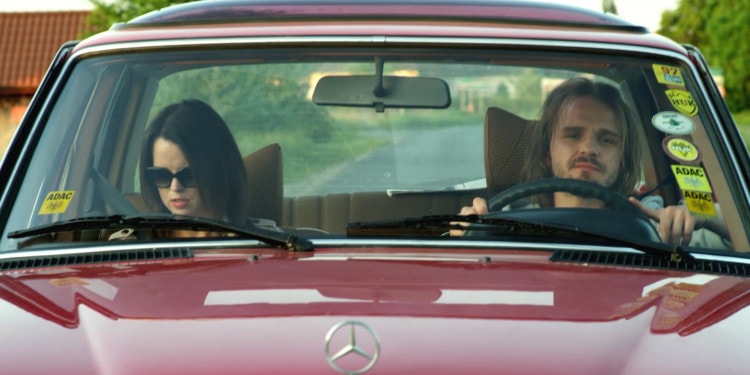An independent filmmaker’s life is challenging and this is how I became one. I was in my last year of the film school when I told one of my tutors that I was only interested in following in the footsteps of my hero filmmakers such as Kieslowski, Mike Leigh or Ken Loach and depict real-life stories, regardless of the financial rewards.
I left the film school in 2004, and what I told my tutor only shows how completely oblivious I was to a small and tiny fact that film making is a business venture. As any other business, films need to make a profit on investment no matter who invests the money (private, corporate or state).
As any graduate, I was full of enthusiasm and firmly believed that what mattered the most was talent, dedication, and the story. Once again it shows how little I knew back then about the dynamics in the film industry, all the financing and politics going on behind closed doors where the decisions are made. Money matters in the indie film making world as much as it matters in the mainstream world.
Indie film making also doesn’t mean working for free or working for next to nothing. It means that budgets are way smaller than films financed by the traditional studio system. And, theoretically, the freedom of creation is greater. For indie films, most of the financing comes from independent sources.
For me, one of the main reasons why I wanted to become an independent filmmaker was my need to be my own boss. I am a kinesthetic learner, and I felt that after leaving the film school I wasn’t ready to go out and get a job in the industry. Indie filmmaking felt safe for me, and I could make mistakes while learning on the job.

 IN THE PHOTO: MAGDA OLCHAWSKA ON THE SET WITH PAWEL PALCAT CREDIT: MAGDA OLCHAWSKA
IN THE PHOTO: MAGDA OLCHAWSKA ON THE SET WITH PAWEL PALCAT CREDIT: MAGDA OLCHAWSKA
Right from the start as an independent filmmaker, I needed to learn a lot of stuff that you can only learn by performing the tasks you need to do to make the film happen. Since there was no one holding my hand or showing me how everything is done, I had to learn fast and improve my skills from one production to another. I’m not saying this is the only way to learn and develop your skills, but in my case, it was the best way to make any progress.
The first thing I learnt, as an indie was that film making is not only about shooting, knowing editing software, or knowing how to budget your production.
Film making is also about marketing and promotion, talking to people, writing pitches, treatments and proposals. Now and then I went into my panic mode, wondering why on Earth I must know all this stuff if the only reason I wanted to be a filmmaker was to tell stories that matter. However, the more I was learning about the industry, the more evident it became that stories and storytelling skills are only a part of an enormous film making puzzle.
Various forms of financing, promotion and marketing strategies, politics, friendships, agents, and film festivals have been congruent parts of that puzzle almost from the moment the entertainment industry was born.
To make any kind of indie film, short or feature, you will need to have not only money but also energy, commitment and crazy determination to write, re-write, edit, re-edit, talk to people, multitask, coordinate all the actions that need to be done during all stages of production, have all the answers preferably right away, be highly organized, try to foresee the future, coordinate the weather if you are shooing outside, and try to make as little mistakes as possible while shooting so you won’t have to go back and re-shoot because by then you already have no money left.
Once your film is in the can you still need to coordinate the whole post-production and be on top of marketing and promotion, which often include entering the film festival circles.

 IN THE PHOTO: MIKOLAY OLCHAWSKI AND DANIEL KNIGHT ON THE SET OF “DAD” CREDIT: ELA GANCARZ
IN THE PHOTO: MIKOLAY OLCHAWSKI AND DANIEL KNIGHT ON THE SET OF “DAD” CREDIT: ELA GANCARZ
On the big budget films, the production can afford to hire many people to run various departments and many runners and assistants to work in those departments.
Independent Filmmaker Face Extra Challenges
On an indie film as a director/filmmaker, you usually wear at least four hats at the same time; that is why your high organizational skills and knowledge about everything that goes into film making are the key to successful shooting. To me, that means finishing the shoot on time and having good footage secured. And also the key to successful post-production and promotion. To me, it means finishing the post-production in a timely manner and getting to a few carefully chosen film festivals, and any awards are always a pleasant surprise.
Sometimes it takes years for an indie film to come out, especially if the director/filmmaker is doing most of the post-production on his/her own. So patience and determination are required in all the stages of production. If you don’t have those in spades, you either have to work hard on that, as I have done, or think of a different career path.
You usually don’t make any money on short films. If you somehow do, it is very little in comparison to the investment of money and time you have to commit.
Short films are still treated as calling cards for filmmakers to show off their skills and storytelling talent. In some cases, a short film is a ticket to a feature film (look at “Whiplash”), but this is relatively rare. Still, most filmmakers develop their short films with that thought in mind.
Related article: “ILLUMINATING PEACE AND JUSTICE THROUGH FILM: MILDRED ACHOCH“
Nowadays the Internet plays a significant role in the film making world, and you can use many websites to distribute your film. The question is how much money you can invest in marketing and promotion and whether or not you can afford to hire a company that could help you get on to Netflix, iTunes, or Amazon (just to name a few). Still, you will battle a massive competition from the mainstream films, but if you play your cards right and make a movie for a very specific audience, you can make some money on it.
Some indie filmmakers are noticed thanks to their online efforts and manage to get jobs making branded and corporate videos, which allows them to invest time and money in more artistic endeavours. Hopefully, in the future, that will help them to move up to more commercial projects (usually that is how it should happen for most filmmakers).
However, before the above scenario can become a reality, it usually takes years of establishing yourself, years of making films on no budgets or very tiny budgets and years of hard work, determination and believing in your storytelling abilities regardless of what others say about your craze to pursue your dream.
Being an independent filmmaker is a lonely job for many years to come before one can break through.

 IN THE PHOTO: PAWEL PALCAT AND PAULA PRESTON ON THE SET OF “ANNA AND MODERN DAY SLAVERY” CREDIT: MAGDA OLCHAWSKA
IN THE PHOTO: PAWEL PALCAT AND PAULA PRESTON ON THE SET OF “ANNA AND MODERN DAY SLAVERY” CREDIT: MAGDA OLCHAWSKA
To be an independent filmmaker, it takes a lot of courage to continually keep on trying and failing (not getting where one wants to get), then trying again full of hope and excitement about the new project.
It takes a lot of work to keep learning and improving skills to make the next film better than the previous one.
On top of improving your skills as an independent filmmaker, you can’t only limit yourself to one narrow area of expertise. You need to know a lot about other departments and other fields to be able to cope with the workload.
Sometimes it feels like all the knowledge you have to accumulate has nothing to do with you as a filmmaker, your filmmaker’s skills, or your desires and dreams. But in reality, you need that extra education on topics such as financing, marketing, promotion to expand on your possibilities and opportunities (it may feel like I keep repeating myself, but I cannot stress enough how important that is).
Of course, you also need to have a hard ass to land on when rejection upon rejection keeps arriving, especially in the early years of your film making career.
Each time, after digesting the rejection, which sometimes is hard, you need to pick yourself up and believe or be deluded enough to know that your path is what your heart desires the most and you can’t see yourself doing anything else than telling visual stories.
As an indie filmmaker, you need to be flexible with your career approach since most of your early years will be devoted to building a name for yourself, which can be a very tedious process that takes years of devotion. I wish there were one guidebook we all could just follow and “make it” but there is no one way or one approach to get you to the top. Keep in mind that everyone’s path to the top is different.
To me, indie filmmaking feels like a bumpy road, which you need to cross to reach the place with fewer bumps. Getting to the top doesn’t mean that no bumps will turn up your way; it simply means you will have more opportunities and possibilities to talk to different people who can help you make your film.
As an indie filmmaker at some point, you will have to realise that however much you want to make independent films you still need to make a living, especially when you have a family. When you are at the start of your career check out what other options are there for you, what skills you could develop that could be transferable and could pay for your mortgage while you are making your indie films.
I know it doesn’t sound like an ideal plan but we all need money to live off and money to invest in our indie projects. So think twice and be wise. Do make sure that you think about your finances and try to make smart, sound decisions at the start. I know sometimes it’s hard, especially when the passion takes over.

 IN THE PHOTO: PAWEL PALCAT ON THE SET OF “ANNA AND MODERN DAY SLAVERY CREDIT: MAGDA OLCHAWSKI
IN THE PHOTO: PAWEL PALCAT ON THE SET OF “ANNA AND MODERN DAY SLAVERY CREDIT: MAGDA OLCHAWSKI
To be an independent filmmaker you will need plenty of self-belief, even, or especially when it’s getting difficult. Spend time and money investing in your own self – development because it’s really easy to pull yourself in and cross over to the dark side. Developing a spiritual side is what is going to stick with you regardless of the outcome of your film making career, and it will get you through the hard times.
As an independent filmmaker, you need to continually look for your voice, try various formats to express yourself and depict your stories. Don’t be scared to experiment. How else will you find out what you like and what works for you and what doesn’t? As an independent filmmaker, you not only should know your strengths but weaknesses too and delegate jobs to people who are experts in the fields that you are not. Do remember that filmmaking is a collaborative art made up of many different departments working together.
Also don’t underestimate film festivals in the life of an independent filmmaker, which are still incredibly important. Hence, you should learn about festivals as much as you can and attend as many of them as you can.
At film festivals, you will, hopefully, meet a few friendly people, watch many fantastic films, and learn first hand what is new and exciting in the film industry. You will also see how the festivals operate, possibly attend some cool parties, and eat delicious food. As important as networking is don’t forget to have fun. If you take yourself too seriously, the whole experience becomes a drag. You don’t need to travel far to attend festivals; almost every city has a film festival nowadays.
In my opinion, the days of indies being only focused on one job are long over. To make it and either move up or make a comfortable living where you are, flexibility and early adaptation are vital. The life of an independent filmmaker is unpredictable; it requires a long-term commitment, a lot of sacrifices and constant growth and search for self.
What I often see (and in all honesty, I made that mistake as well) is that an indie filmmaker stops living and only lives from one project to another, which is a huge mistake. Life is exciting, surprising and full of beautiful stories ready to be told as long as the filmmaker wants to open up and listen to what life offers.
So grow, learn, and live fully and tell real stories about real characters, stories that will matter and enrich others even if it’s only a few people or for few minutes. And most important, enjoy the sweet, joyful, rocky journey of an indie filmmaker.
Editors Note: The opinions expressed here by Impakter.com columnists are their own, not those of Impakter.com









